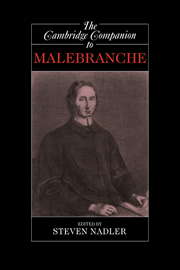Book contents
- Frontmatter
- Introduction
- 1 Malebranche and Method
- 2 Malebranche on the Soul
- 3 Malebranche on Ideas and the Vision in God
- 4 The Malebranche-Arnauld Debate
- 5 Malebranche on Causation
- 6 Metaphysics and Philosophy
- 7 Malebranche's Theodicy
- 8 Malebranche on Human Freedom
- 9 Malebranche's Moral Philosophy
- 10 The Critical Reception of Malebranche, from His Own Time to the End of the Eighteenth Century
- 11 Malebranche's Life and Legacy
- Bibliography
- Index
1 - Malebranche and Method
Published online by Cambridge University Press: 28 May 2006
- Frontmatter
- Introduction
- 1 Malebranche and Method
- 2 Malebranche on the Soul
- 3 Malebranche on Ideas and the Vision in God
- 4 The Malebranche-Arnauld Debate
- 5 Malebranche on Causation
- 6 Metaphysics and Philosophy
- 7 Malebranche's Theodicy
- 8 Malebranche on Human Freedom
- 9 Malebranche's Moral Philosophy
- 10 The Critical Reception of Malebranche, from His Own Time to the End of the Eighteenth Century
- 11 Malebranche's Life and Legacy
- Bibliography
- Index
Summary
The title of Malebranche's first, longest, and most important work might well have been Discourse on Method, for method is what The Search After Truth is most obviously about. Its subtitle adumbrates the centrality of method: wherein are treated the nature of man's mind and the use he must make of it to avoid error in the sciences. The importance of finding a method to avoid error is expressed in the first sentence of the Search's first book: “error is the cause of men's misery” for from it comes the evil that upsets human happiness. Each of the five major occasions of error is detailed by the first five books of the work, and the last book, on method, indicates “the paths leading to knowledge of the truth ” [Search VI.1.i, OC 2:245; LO 408). The method that Malebranche proposes is, like his vision of all things in God, a highly original result of correcting Descartes in light of the Christianized Platonism that he received from Augustine.
The seventeenth century was the belle époque of method. The prominence of scientific advance in the period was such that extreme epistemic optimism was pandemic. It seemed that among rationalists everything was knowable and would soon be known, and that even among empiricists who set limits to human knowledge, those limits would soon be achieved. A sharp break from all precedent was universally perceived; these moderns felt that they were uniquely doing something right, and somehow doing it systematically given the results being achieved, thus the preoccupation with the discovery and articulation of method. (Whether the break with the past was as sharp as the moderns thought is, of course, another question. Nor did the pandemic optimism preclude the period from also being the belle epoche of skepticism.)
- Type
- Chapter
- Information
- The Cambridge Companion to Malebranche , pp. 8 - 30Publisher: Cambridge University PressPrint publication year: 2000
- 3
- Cited by



